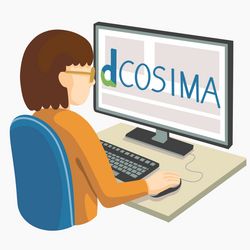
D1Ma2: Promoting competencies for document-based diagnosis of student mathematical performance in simulation-based learning environments.

The diagnosis of learning processes and learning outcomes of students is a core task of teachers (c.f. KMK 2014). Correct diagnoses of student performance are not only the basis for decisions about support measures, but also a necessary prerequisite for adaptive teaching. Although diagnostic competence of teachers has an impact on student achievement, hardly any subject-specific efforts have been made to promote this competence in the first phase of teacher education. This is where the project comes in and aims to investigate and empirically substantiate instructional support measures to promote diagnostic competence in intervention studies.
To achieve this, a simulation-based learning environment was developed and evaluated in the first phase. The prospective elementary school teachers studied evaluated the diagnostic situations presented in the learning environment as authentic and were able to engage with the situations. In addition, the learning environment is suitable for recording and making visible the diagnostic process by means of process data (cf. Wildgans-Lang et al. 2020).
In the second phase, various support measures are integrated into the learning environment. One method that has already been shown to be effective in other learning contexts is scaffolding. Scaffolding aims to reduce and regulate the complexity of learning situations in order to support the learning process. On the one hand, scaffolding with subject didactic content is suitable for promoting teachers' diagnostic competencies, which facilitates the linking of task features and subject didactic categories. On the other hand, scaffolding on a strategic level can also support the diagnostic process by encouraging learners to proceed strategically. Since it is expected that the effectiveness of scaffolding depends on learners' learning preferences, Study 1 compares the effects of the two types of scaffolding on diagnostic processes and on diagnostic quality between student teachers and practicing teachers. In Study 2, which follows on from this, learners' eye movements will additionally be investigated in a smaller sample. Capturing eye movements will contribute to a better understanding of whether and how learners use scaffolding. Finally, Study 3 will investigate the effects of role scaffolding on the processes and quality of diagnosing in dyads.

Overall, the project will help describe diagnostic processes among prospective and practicing teachers at a high-resolution level and identify effective supports to promote diagnostic skills.
Project-related publications and presentations
Schons, C., Obersteiner, A., Reinhold, F., Fischer, F., & Reiss, K. (accepted). Fostering prospective mathematics teachers’ diagnostic competencies in simulations: The effects of scaffolding. Journal für Mathematik-Didaktik.
Schons, C., Obersteiner, A., Reinhold, F., Fischer, F., Reiss, K. (2021). Stimulating prospective mathematics teachers' diagnostic competencies with scaffolding. Meeting of the scientific network “Developing and stimulating competencies: Methodological challenges and opportunities for research”. Leuven (BE).
Schons, C., Obersteiner, A., Reinhold, F., Fischer, F., & Reiss, K. (2021). Förderung von Diagnosekompetenzen angehender Mathematiklehrkräfte mit Simulationen: Effekte durch Scaffolding. Sitzung des Arbeitskreises Empirische Bildungsforschung der GDM, Online.
Schons, C., Obersteiner, A., Fischer, F., Reiss, K. (2021). Learning to diagnose: effects of scaffolding in a simulation for prospective primary school teachers. 18th Biennial Conference of the European Association for Research on Learning and Instruction (EARLI). Gothenburg (SWE).
Schons, C., Obersteiner, A., Fischer, F., & Reiss, K. (2021). Scaffolding zur Förderung von Diagnosekompetenzen angehender Grundschullehrkräfte in Mathematik. Symposium - Cosima meets ProSim, Online.
Schons, C., Obersteiner, A., Fischer, F., & Reiss, K. (2020). Förderung von Diagnosekompetenzen durch Scaffolding. In H.-S. Siller, W. Weigel & J. F. Wörler (Hrsg.), Beiträge zum Mathematikunterricht 2020 (S. 1535). Münster: WTM-Verlag. http://dx.doi.org/10.17877/DE290R-21544
Wildgans-Lang, A., Reiss, K., & Obersteiner, A.(accepted). Supporting mathematical teachers’ criteria-oriented assessment in a learning environment. Annual Meeting of the American Educational Research Association (AERA). San Francisco, CA (USA). [Conference postponed]
Wildgans-Lang, A., Scheuerer, S., Obersteiner, A., Fischer, F., & Reiss, K. (2020). Analyzing prospective mathematics teachers’ diagnostic processes in a simulated environment. ZDM Mathematics Education, 52, 241–254. https://doi.org/10.1007/s11858-020-01139-9
Wildgans-Lang, A., Obersteiner, A., & Reiss, K. (2019). Epistemisch-diagnostische Aktivitäten im Diagnoseprozess bei Lehrkräften im Mathematikunterricht. In T. Ehmke, P. Kuhl, & M. Pietsch (Hrsg.). Lehrer. Bildung. Gestalten. Beiträge zur empirischen Forschung in der Lehrerbildung (S. 281–291). Beltz Juventa.
Waldleitner, M., Wildgans, A., Obersteiner, A., Fischer, F., & Reiss, K. (2019). Scaffolding beim Erwerb von Diagnosekompetenzen in einer simulationsbasierten Lernumgebung. In A. Frank, S. Krauss, & K. Binder(Hrsg.) Beiträge zum Mathematikunterricht 2019 (S. 865–868). Münster: WTM-Verlag. http://dx.doi.org/10.17877/DE290R-20772
Wildgans, A., Obersteiner, A., Fischer, F., & Reiss, K. (2019). Diagnosekompetenz - Die Relevanz eines strategischen Vorgehens bei der Diagnose. In A. Frank, S. Krauss, & K. Binder (Hrsg.) Beiträge zum Mathematikunterricht 2019 (S. 1422). Münster: WTM-Verlag. http://dx.doi.org/10.17877/DE290R-20747
Wildgans, A., Reiss, K., Obersteiner, A., & Fischer, F. (2018). Analyse der Diagnosekompetenzen von Studierenden des Grundschullehramtes Mathematik in simulationsbasierten Lernumgebungen. Tagung der Gesellschaft für Empirische Bildungsforschung (GEBF). Basel (CH).
Wildgans, A., Obersteiner, A., Fischer, F., & Reiss, K. (2018). Analyse der Diagnosekompetenzen von Studierenden des Grundschullehramtes in simulationsbasierten Lernumgebungen. In Fachgruppe Didaktik der Mathematik der Universität Paderborn (Hrsg.) Beiträge zum Mathematikunterricht 2018 (S. 1979–1982). Münster: WTM-Verlag. http://dx.doi.org/10.17877/DE290R-19777